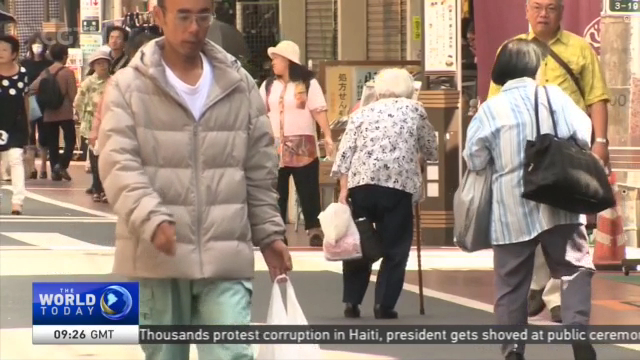
19:01, 18-Oct-2018
Japan Elderly Care: High-tech device helps monitor the elderly
Updated
18:34, 21-Oct-2018
02:59

Now let's go to Japan, where high-tech is helping the country address the demands of a fast-aging society. As the need for senior care grows, many are struggling to maintain their lives while taking care of their elderly family. And in some cases, couples even turn to divorce to care for their own parents. Terrence Terashima reports from Tokyo.
Japanese Prime Minister Shinzo Abe has renewed his pledge to continue with social welfare policies. That's to tackle Japan's biggest crisis: the fast ticking demographic time bomb of an ageing population. A recent survey showed the country's population declining by 0.21 percent from last year, while the number of those aged 65 and over increased by 1.37 percent. And that's presenting communities with renewed predicaments. There are diminishing younger generations to take care of the elderly – not just in the financial sense, but also the physical ability itself.
TERRENCE TERASHIMA TOKYO "There are alarming statistics. 34.8 percent of the elderly surveyed said they are having financial problems and almost 30 percent of them live alone. 101-thousand people said they had to quit their jobs to care for elderly family members. Some even have to divorce their spouse to care for their respective parents."
For those who don't live with their family, it's up to them to take care of themselves. But how can people be notified if something happens?
KIYOSHI IDE CEO, VALUECARE "Increasing number of elderly live alone without people to attend to, and some even face a lonely death. We need the means to monitor their activities and to ensure their safety."
Valuecare – which focuses on innovative nursing care -- has come up with a solution. It enables families to monitor elderly members living alone, without installing expensive remote cameras, which raises privacy concerns. This small gadget can monitor movements such as opening a cupboard or fridge. It even has a button they can press to let a family member or next of kin to know they are well.
KIYOSHI IDE CEO, VALUECARE "Movements are detected, and it sends a message to a mobile app to let families know they are active. It also sends a message when no motion is detected for lengthy period."
There are a number of such gadgets available, such as GPS trackers, water heaters or electric pots that send signals every time it is being used. Experts say, there will be an increase in uses of such technology for elderly care, but these solutions may only be temporary ones, as the country finds a real solution to the problem of an aging population. Terrence Terashima, CGTN, Tokyo.

SITEMAP
Copyright © 2018 CGTN. Beijing ICP prepared NO.16065310-3
Copyright © 2018 CGTN. Beijing ICP prepared NO.16065310-3